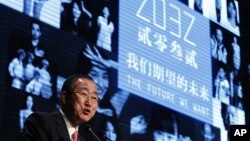The U.N. secretary-general started his three-day visit to China by reaching out to Chinese Internet users in a chat session streamed online. Ban Ki-moon answered questions about Syria, the United Nations' core missions, as well as personal questions about his Asian cultural background. He also gave his evaluation of China's overseas peackeeping efforts and its involvement in Africa.
The hour-long Q&A session was mediated by one of China’s most famous talk show hosts, Yang Lan. Users of Weibo, China’s top micro-blogging service, sent in more than 16,000 questions.
The situation in Syria
Ban said that news of the continued violence in Syria sometimes deprives him of sleep.
“This must stop, at any cost,” he said, and added that China could play an important role in resolving this issue.
China in the past has allied with Russia in blocking Western-backed U.N. resolutions that call for sanctions against Syria.
Ahead of Ban's arrival, the official People's Daily newspaper ran a commentary rejecting foreign intervention in the crisis.
China’s role in Africa
On Thursday, Ban attends the ministerial summit of China-African countries, a meeting that seeks to enhance cooperation between the world’s second largest economy and developing countries in Africa. Ban praised the summit, and said that South to South cooperation will benefit all sides.
Ban said that though Africa is a land of opportunities and potential, many challenges still hamper its development. “China can help African countries to strengthen their capacity to cope with these difficulties and challenges,” Ban said.
During the interview, Ban also praised the work of 2,000 Chinese peacekeeping forces working around the world saying that he hoped that Chinese engagement continued to promote peace and security in the world.
Ban’s philosophy on diplomacy
An Internet user named Yanshui Ruhua quoted Ban’s public reference of an ancient Chinese thinker, Laozi, and asked the secretary-general how such ancient philosophy could be applied to his work. Ban answered by acknowledging his own Confucian background, but said that both Asian and Western philosophy helped him when facing difficult tasks.
Ban, who had studied calligraphy as a child but abandoned it later in life, said that he recently started to practice it again. He drew a parallel between impeccable calligraphy and good diplomatic work, saying that though the outcome might seem effortless in both, it takes a lot of work behind the scenes to achieve good results.
Updates on Ban’s conversation with Chinese Internet users were posted on the U.N.’s Weibo account, which was created in 2010 and now counts more than two million followers. The interview was part of an effort by the U.N. to better communicate with citizens of different countries.
“The United Nations has a very lofty ideals and goals,” Ban said, adding that these objectives should be disseminated so that the world’s peoples can understand and share them.
Apart from meeting China’s leaders and take part in the China-Africa summit, Ban is expected to meet with Chinese people who contributed to the “Future We Want” campaign, a U.N. initiative encouraging sustainability and creativity in the world.
The hour-long Q&A session was mediated by one of China’s most famous talk show hosts, Yang Lan. Users of Weibo, China’s top micro-blogging service, sent in more than 16,000 questions.
The situation in Syria
Ban said that news of the continued violence in Syria sometimes deprives him of sleep.
“This must stop, at any cost,” he said, and added that China could play an important role in resolving this issue.
China in the past has allied with Russia in blocking Western-backed U.N. resolutions that call for sanctions against Syria.
Ahead of Ban's arrival, the official People's Daily newspaper ran a commentary rejecting foreign intervention in the crisis.
China’s role in Africa
On Thursday, Ban attends the ministerial summit of China-African countries, a meeting that seeks to enhance cooperation between the world’s second largest economy and developing countries in Africa. Ban praised the summit, and said that South to South cooperation will benefit all sides.
Ban said that though Africa is a land of opportunities and potential, many challenges still hamper its development. “China can help African countries to strengthen their capacity to cope with these difficulties and challenges,” Ban said.
During the interview, Ban also praised the work of 2,000 Chinese peacekeeping forces working around the world saying that he hoped that Chinese engagement continued to promote peace and security in the world.
Ban’s philosophy on diplomacy
An Internet user named Yanshui Ruhua quoted Ban’s public reference of an ancient Chinese thinker, Laozi, and asked the secretary-general how such ancient philosophy could be applied to his work. Ban answered by acknowledging his own Confucian background, but said that both Asian and Western philosophy helped him when facing difficult tasks.
Ban, who had studied calligraphy as a child but abandoned it later in life, said that he recently started to practice it again. He drew a parallel between impeccable calligraphy and good diplomatic work, saying that though the outcome might seem effortless in both, it takes a lot of work behind the scenes to achieve good results.
Updates on Ban’s conversation with Chinese Internet users were posted on the U.N.’s Weibo account, which was created in 2010 and now counts more than two million followers. The interview was part of an effort by the U.N. to better communicate with citizens of different countries.
“The United Nations has a very lofty ideals and goals,” Ban said, adding that these objectives should be disseminated so that the world’s peoples can understand and share them.
Apart from meeting China’s leaders and take part in the China-Africa summit, Ban is expected to meet with Chinese people who contributed to the “Future We Want” campaign, a U.N. initiative encouraging sustainability and creativity in the world.





